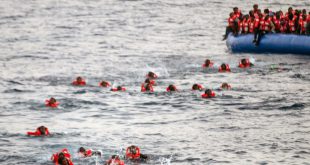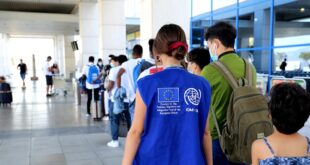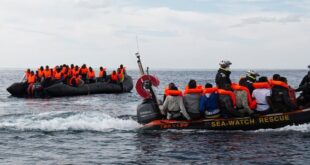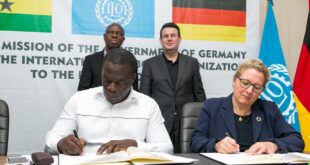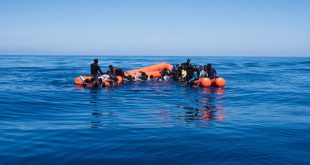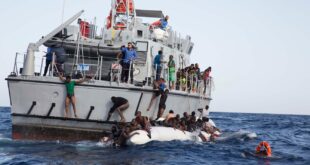Murder, torture, arbitrary detention, gang rape, forced labour, extortion: A recent United Nations report details the horrors suffered by migrants and refugees in Libya. The authors call on the European Union to increase rescues efforts in the Mediterranean and to facilitate the work of humanitarian ships. Julia Dumont and Monique El-Faizy report.
A recent report, jointly published on 18 December by the United Nations Support Mission in Libya (UNSMIL) and the Office of the United Nations High Commissioner for Human Rights, paints a scary picture of the situation for migrants and refugees in Libya.
Based on first-hand accounts from roughly 1,300 migrants collected in Libya between January 2017 and August 2018, the 60-page document portrays a situation in which migrants are victims of Libyan state officials, armed groups, smugglers and traffickers. The report also includes information gathered from migrants interviewed in Nigeria and Italy after they had left Libya.
‘Human rights violations and abuses at every step of the way’
Murder, torture, arbitrary detention, gang rape, slavery, forced labour, and extortion are just a few of the “unimaginable horrors” suffered by migrants in Libya, according to the report.
Smugglers routinely assault women and exploit young women. “The overwhelming majority of older women and girls interviewed by UNSMIL reported being gang raped by smugglers or traffickers or witnessing other people being taken out of collective accommodations to be abused. Younger women travelling without male relatives are also particularly vulnerable to being forced into prostitution,” the report states.
‘Shot, tortured to death, or simply left to die’
It’s not just women who are at risk. “Countless migrants and refugees lost their lives during captivity by smugglers or traffickers after being shot, tortured to death, or simply left to die from starvation or medical neglect,” the report bleakly notes. “Across Libya, unidentified bodies of migrants and refugees bearing gunshot wounds, torture marks and burns are frequently uncovered in rubbish bins, dry river beds, farms and the desert.”

Because of racism, migrants and refugees from sub-Saharan Africa are often subject to particular abuse, the authors found.
Winding up in the hands of authorities reportedly presents no respite, as the living conditions in Libyan detention centres are inhumane. “During visits to (…) detention centres in 2017-2018, UNSMIL staff have consistently observed severe overcrowding, lack of proper ventilation and lighting, inadequate access to washing facilities and latrines, constant confinement, denial of contact with the outside world, and malnutrition,” the report said.
Not only do Libyan authorities appear unwilling to address the human rights violations, but they are often complicit, the two UN organizations found. Years of war have left state institutions weak and state bodies infiltrated by members of armed groups.
The weakened government “provides fertile ground for thriving illicit activities, such as trafficking in human beings and criminal smuggling, and leaves migrant and refugee men, women and children at the mercy of countless predators who view them as commodities to be exploited and extorted for maximum financial gain,” the paper notes.
Few legal protections for migrants
There are few legal protections for migrants in Libya. Entering Libya irregularly is illegal and the penalty is imprisonment until deportation, regardless of individual circumstances or whether someone is entitled to asylum or humanitarian protection. “Libya has no asylum system, has not ratified the 1951 Convention relating to the Status of Refugees, and does not formally recognize the United Nations High Commissioner for Refugees (UNHCR),” the report states.
Most of those in detention have never been tried and languish in detention.
But migrants who aren’t in detention are also frequently abused and exploited. They are subject to arbitrary arrests and employers often refuse to pay their wages knowing that they have virtually no recourse. Sick and injured migrants, as well as pregnant women in labour, have been denied care at public hospitals, the report says.

Request for Libya: Emphasize human rights in migration policies
The report calls on Libya to emphasize human rights in its migration policies. The authors also voiced the following requests:
– The government should begin by releasing those who are being detained arbitrarily
– It should close all detention centres that don’t meet minimum standards
– It should provide alternatives to detention
– Human rights monitors should be given unimpeded access
– Authorities should “clearly signal that atrocities against migrants and refugees will no longer be tolerated, regardless of whether perpetrators are smugglers, traffickers, members of armed groups or State officials”
– Violators should be held accountable
‘The EU must also reconsider the human cost of their policies’
The report doesn’t spare the European Union – it calls upon the EU and its member states to step up their search-and-rescue operations in the Mediterranean and to facilitate the operations of rescue vessels operated by humanitarian organizations.
By preventing humanitarian NGOs from helping boats at sea and delegating this task exclusively to the Libyan coastguards – who are instructed to return migrants to Libya – EU Member States are violating the principle of non-refoulement, which “prohibits the return of anyone to a place where the individual is at risk of death, torture and other cruel, inhuman or degrading treatment or punishment, or other irreparable harm,” the report states.
It continues: “The European Union and its Member States must also reconsider the human costs of their policies and efforts to stem migration to Europe and ensure that their cooperation and assistance to the Libyan authorities are human rights-based … and do not, directly or indirectly, result in men, women and children being trapped in abusive situations with little hope of protection and remedy.”
Between 700,000 and one million foreign nationals are in Libya, according to estimates. The majority of them are originally from sub-Saharan and North African countries. About 10 percent of them are children, half of whom are unaccompanied.
© InfoMigrants
 THE AFRICAN COURIER. Reporting Africa and its Diaspora! The African Courier is an international magazine published in Germany to report on Africa and the Diaspora African experience. The first issue of the bimonthly magazine appeared on the newsstands on 15 February 1998. The African Courier is a communication forum for European-African political, economic and cultural exchanges, and a voice for Africa in Europe.
THE AFRICAN COURIER. Reporting Africa and its Diaspora! The African Courier is an international magazine published in Germany to report on Africa and the Diaspora African experience. The first issue of the bimonthly magazine appeared on the newsstands on 15 February 1998. The African Courier is a communication forum for European-African political, economic and cultural exchanges, and a voice for Africa in Europe.




